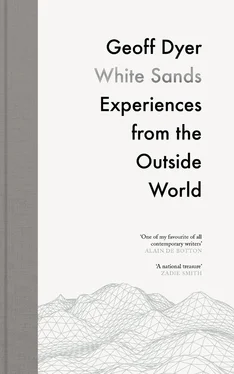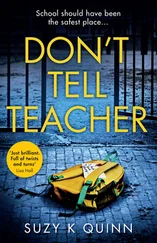‘She’s in shock,’ I said. ‘She doesn’t know what she’s saying.’ I had no desire to drive either, and so we both ended up as passengers, each on a sled driven by one of the guides. We made much better progress like this.
And it wasn’t pitch black, I could see now. There was a glimmer of dark light around the dark contours of the mountains or whatever they were, and a glimmer of stars, but the overwhelming impression was that there was nothing to see. My toes were still numb but, despite my fears about freezing sweat, I was surprisingly warm, especially when I discovered that the blue rug Jessica had been sitting on was actually a kind of mini — sleeping bag and I was able to add yet another layer of insulation. Bundled up like this, like a frozen mummy, it was quite fun, barrelling through the barren wastes. I didn’t have much on my mind except for thinking how much better it would have been to do this in the mystic twilight of February, when you could actually see where you were, but at least there was a suggestion of light in the sky, even if, by any normal definition of the phrase, it was still pitch dark. Oh, and I had come to love the huskies. Irrespective of what the job entails, I love anyone — man or beast — who does their job well, and these huskies, whose job was to pull a sled, were absolute in their huskiness. From reading about Amundsen’s expedition to the South Pole I knew that, if the going got tough, the huskies could be fed to each other. Yeti kept up a lovely sing-song of instruction and encouragement, which, for all I knew, constantly reminded the dogs of this fact, that the weak would become food for the less weak. So has it always been, so will it always be! Since she was singing I started singing too, one of the cadence songs from Full Metal Jacket : ‘I don’t know but I been told. . I don’t know but I been told . . Eskimo pussy is mighty cold.’ And then I thought of the film Atanarjuat ( The Fast Runner ), which, among its many other virtues, hotly refutes this claim. My mind was wandering, but it kept coming back to the immediate reality, which was that we were out in the open air, in pitch darkness — the brief period when a glimmer of dark light appeared on the horizon had already come to an end, was no more than a memory now — in freezing conditions, and that the Northern Lights were nowhere to be seen.
It took an hour to get back to the dog yard, back to the infernal but adorable yapping of the dogs, both those who had been out, who had had their day, and those who had not, who hoped their day was still to come, still to be had. We had to de-harness our dogs and return them to their kennels, but I didn’t even make the pretence of helping. I just stood around, thinking about my cold feet, letting the guides do the donkey work for which they were, after all, being paid — and paid handsomely if they were able to survive the punishing expense of living in Norway, even if this meant they were only paid the minimum wage, which must have been about a hundred grand a year. Once the dogs were back in their kennels we tramped over to the cozy trappers’ cabin. Just as the so-called ‘light’ in the sky had actually been dark, so, by any normal standards, it was freezing cold in the cabin, but, relatively speaking, it was toasty. The talk, as we drank hot coffee, was of frostbite. If you get bitten in your cheek you place a hand there but you don’t rub, you hold your warm hand to your cheek — assuming, of course, that your hand is not a solid lump of blood-ice too. Birgitte and Yeti were both in their early twenties and they loved it up here in the winter.
‘Why?’ I asked, and it was obvious that the single word was followed, inaudibly, by two others: on earth, as in Why on earth would anyone want to spend their time in a hellhole like this? Well, they liked the social life and the slow return of daylight. And today had been a joyous experience for them. Birgitte had been away on vacation for ten days. When she had last been out here there was no light at all; today there had been a glimmer. So the polar night, though still immense, was receding. There was light at the end of the tunnel.
‘Which still begs the question,’ Jessica said later, ‘of why anyone would choose to live in a tunnel. ’
We spent the so-called ‘afternoon’ in our room. Jessica told me about the Annie Dillard essay she was reading, about polar explorers and the solemn reserve of the prose in which their adventures were recounted. Dillard wonders if this was part of the selection process—‘or even if some eminent Victorians, examining their own prose styles, realized, perhaps dismayed, that from the look of it, they would have to go in for polar exploration.’ I remember making a cautionary mental note about that— Avoid solemn splendour —after which I don’t know what I did. I think I had frostbite of the brain or something, because I just sat there and thawed — thawed about nothing — until it was time to head out to the bar of the nearby Radisson Hotel for dinner. In any normal part of the world this would have involved a ten-minute walk, but by now the idea that places existed where the simple act of stepping outside did not require careful preparation and planning seemed quaintly implausible. It was the coldest and darkest night in the entire history of the planet, possibly of any planet. I looked up occasionally in case the Northern Lights showed up, but mainly I kept my eyes on the ground in case I slipped.
The bar of the Radisson was awash with information and rumour about the Northern Lights. Tourists and residents all had their stories. The Lights could be seen at any time, but the best chance was in the evening. From six o’clock onwards. Others said there was more chance of activity from about eleven onwards. I liked this word ‘activity’ with its suggestion of the paranormal, but mainly I liked the way that it was being said inside a restaurant. Then someone claimed that we were actually too far north for the Northern Lights. We were feeling confused and more than a bit dejected, so it was reassuring to hear the barman announce that they would now be showing, on a large-screen TV, live football from the Premiership. Arsenal — Man City! Fuck the Northern Lights with their unscheduled, possibly even mythical appearances. This floodlit game was scheduled and was going ahead on time, exactly as advertised. The bar filled up. Midway through the second half, the barmaid, who had nipped outside for a cigarette, told us the Northern Lights were happening. We dashed outside. There was a faint glimmer in the general night-glimmer, but light pollution from the town meant that we could see almost nothing. We went back in and watched the rest of the football, unsure whether to feel relieved — because we were back inside, out of the cold, or depressed because, although we could watch Premiership games any old time, this was our only chance to have the once-in-a-lifetime experience of the Northern Lights Experience.
In the so-called ‘morning’ the cheerful young woman at Basecamp reception asked if we had seen the Northern Lights the night before.
‘No,’ I said, ‘but we did see the football!’ I was only joking even if, strictly speaking, I wasn’t joking. I was actually deeply disappointed, but, in a weird Nordic turnaround, we had become the source of disappointment to our hosts. The implication was clear: not seeing the Northern Lights was a result not of their non-appearance but a failure on our part, a failure of perception and attitude. Finding this a little hard to take, I found myself saying that I ‘took umbrage’ at such a claim, even though this was a phrase I never normally use. It was like If you’re going to get all Norwegian-mystic with me, young lady, I’ll get all middle-England-tourist with you, even if this amounted to standing there looking downcast and crestfallen. We wanted to see the Northern Lights. We had come all this way, to this blighted place, to see the Northern Lights. We came at what, from every other point of view, was a ghastly time of the year, to see the Northern Lights. But seeing the Northern Lights can apparently be a much subtler affair than the photographs — swirling geysers of psychedelic green — lead one to expect. Sometimes they are so subtle that your eyes and mind have to be attuned. Seeing is believing — and believing is seeing. Once you have seen the Northern Lights — once you know what you are looking for — you believe you can see them again. In this respect it reminded me of early attempts to get stoned (which in turn reminded me that there is a famous strain of pure indica called Northern Lights). You could not get stoned — this was in the days before skunk, before you knew without doubt that your brains were in the process of being blown out — until you knew what it was like to be stoned. The more conversations we had, the more the Northern Lights — which, I had assumed, came as standard in this part of the world, at this time of the year — took on some of the unverifiable allure of the Loch Ness Monster or the Abominable Snowman.
Читать дальше












